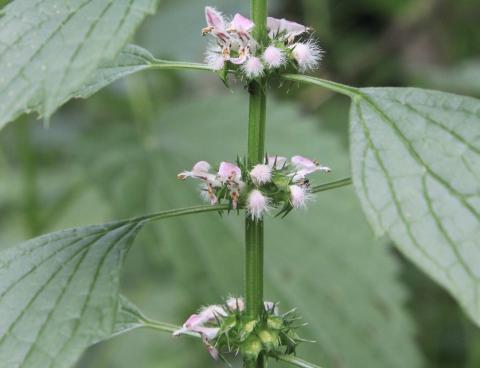
Botanical names of herbs sometimes tell you what the herb does. Motherwort’s botanical name is Leonurus cardiaca, meaning “lion hearted.” It is, indeed, a supreme herb for the heart.
Here are some of the things Motherwort does for cardiovascular health:
1. Reduces Palpitations
Motherwort has traditionally been used for “nervous” heart issues. It’s one of the best herbs for irregular heartbeat that results from issues other than serious heart disease. I’ve had motherwort in my formula for several years. I’ve a heart murmur due to a mildly defective heart valve. Stress, too much caffeine, or intense physical activity triggers palpitations or, sometimes, a rapid heartbeat. I went on motherwort after an episode while cycling in Santa Fe, 7000 feet above where I lived at the time. I picked up a tincture at the famous Herbs, Etc. and didn’t have a problem for the rest of the trip, even on hikes high up in the mountains.
Motherwort combines well with hawthorn for heart rhythm. Whenever I stop either herb, the palpitations (atrial fibrillations in my case) increase in both frequency and intensity.
Motherwort seems to regulate heart rhythm by influencing heart cell function, reducing feelings of stress, and by calming down an overactive thyroid.
2. Reduces Blood Pressure
Another traditional use for motherwort is mild to moderate high blood pressure in stressed out folks. Motherwort’s “hypotensive” effects rely on at least four actions. One, it is a sedating herb. Two, it directly influences heart cell function. Three, it’s a mild diuretic. Diuretics reduce blood volume, which in turn reduces blood pressure. And four, motherwort relaxes the smooth muscle around blood vessels, opening them up so the heart doesn’t have to pump as hard to move the blood. Herbal components that do these things are just beginning to be identified and include a chemical called leonurine as well as the plant’s aromatic oils. If you are interested in motherwort or other herbs but are on blood pressure reducing medications, see a practitioner who can work together with your doctor. Don’t combine herbs and meds on your own.
3. Improves Circulation
Antioxidant and anti-inflammatory activities of motherwort support healthy arteries by reducing plaque formation and other problems. The result is better blood flow, including to the heart itself. Motherwort is considered a blood-thinning herb by herbalists and this has been confirmed in a clinical trial. Note that motherwort should not be combined with prescription anti-coagulant medications.
4. Improves Overall Heart Health
Remember that Motherwort’s other name is Lion Hearted! It’s a traditional cardiotonic and is used to strengthen a weak heart. As an athlete, I notice a difference in my “cardio” with motherwort. We already know that motherwort does many things that result in a healthier heart. Studies are showing other benefits, confirming motherwort’s age-old use as a heart tonic. For instance, that it protects heart cells from free radical damage. It also improves blood flow to the heart. After all, on top of pumping blood to the rest of the body, the heart itself needs healthy blood flow!
5. Soothes the Emotional Heart
The heart is the home of the Shen, in Traditional Chinese Medicine. The Shen can be roughly translated as our spirit, mind, consciousness and vitality. Our emotions can be a reflection of how healthy our Shen is. Motherwort has been used for a long time to “gladden the heart” and as such can be considered a Shen tonic. It’s helpful for heartbreak and the associated sadness, anger, and depression.
Motherwort has pronounced calming effects when the heart is troubled by stress. It can also be quite effective for anxiety attacks…a squirt or two of liquid extract often takes care of it, though it may make you quite drowsy. I had an anxiety attack while working with a student. It started due to, appropriately enough, fairly strong palpitations. Motherwort immediately calmed both my heart and nerves, though it was a bit harder to focus from the sedation.
Motherwort is native to Europe and Asia but grows well in many places. Even here in the solid clay soils and dryness of Durango, Colorado, motherwort grows to towering heights. That said, it is partial to regular watering. Motherwort is a beautiful addition to the garden and looks like a typical mint, with square stems, opposite leaves and lovely pink/purple flowers. But it doesn’t taste like a typical mint…it’s super bitter. For this reason, I use motherwort as a liquid extract rather than as tea, as it’s pretty challenging to get the tea down.
Motherwort provides a mind-boggling array of other benefits beyond the heart. We’ll explore these in the future!








